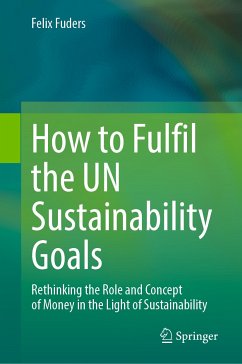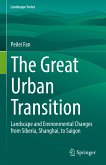This book combines the field of economics -especially monetary theory- with other disciplines like ecology, physics, humanities, social sciences and development theory. This transdisciplinary approach makes the book a unique contribution for researchers, students, policy makers and professionals working in governmental or nongovernmental institutions, as well as anyone interested in society's well-being and achieving a true social-ecological transformation. It is written in an accessible language in order to reach a broad audience.
In 2015, more than 190 world leaders recognized that the world is on a "collision course" (Max-Neef) and committed to 17 Sustainable Development Goals (SDGs). Many conferences and high-level meetings have been held since then, and one of the most frequently discussed topics is how to finance these goals. There is a widespread belief that coming up with more money for sustainable development will "do the trick". Usually, the discussions focus on finding additional financial resources in order to achieve the goals faster. In this book it is argued that not only is more money needed, but it needs to be a different kind of money. The book demonstrates that ALL but one of the SDGs are directly linked to our monetary system, which -being completely unnatural- can be seen as the most important, but at the same time least recognized, reason for market failure. Many people think we just need to do more, faster, better. Very few say that we have done things fundamentally wrong and that the institutions and values which motivated us to do those things need to be changed. It will be concluded that only if we change our unnatural design of money to a more natural one, will we be able to reach these goals
Dieser Download kann aus rechtlichen Gründen nur mit Rechnungsadresse in A, B, BG, CY, CZ, D, DK, EW, E, FIN, F, GR, HR, H, IRL, I, LT, L, LR, M, NL, PL, P, R, S, SLO, SK ausgeliefert werden.
Hinweis: Dieser Artikel kann nur an eine deutsche Lieferadresse ausgeliefert werden.
Es gelten unsere Allgemeinen Geschäftsbedingungen: www.buecher.de/agb
Impressum
www.buecher.de ist ein Internetauftritt der buecher.de internetstores GmbH
Geschäftsführung: Monica Sawhney | Roland Kölbl | Günter Hilger
Sitz der Gesellschaft: Batheyer Straße 115 - 117, 58099 Hagen
Postanschrift: Bürgermeister-Wegele-Str. 12, 86167 Augsburg
Amtsgericht Hagen HRB 13257
Steuernummer: 321/5800/1497
USt-IdNr: DE450055826
Bitte wählen Sie Ihr Anliegen aus.
Rechnungen
Retourenschein anfordern
Bestellstatus
Storno









